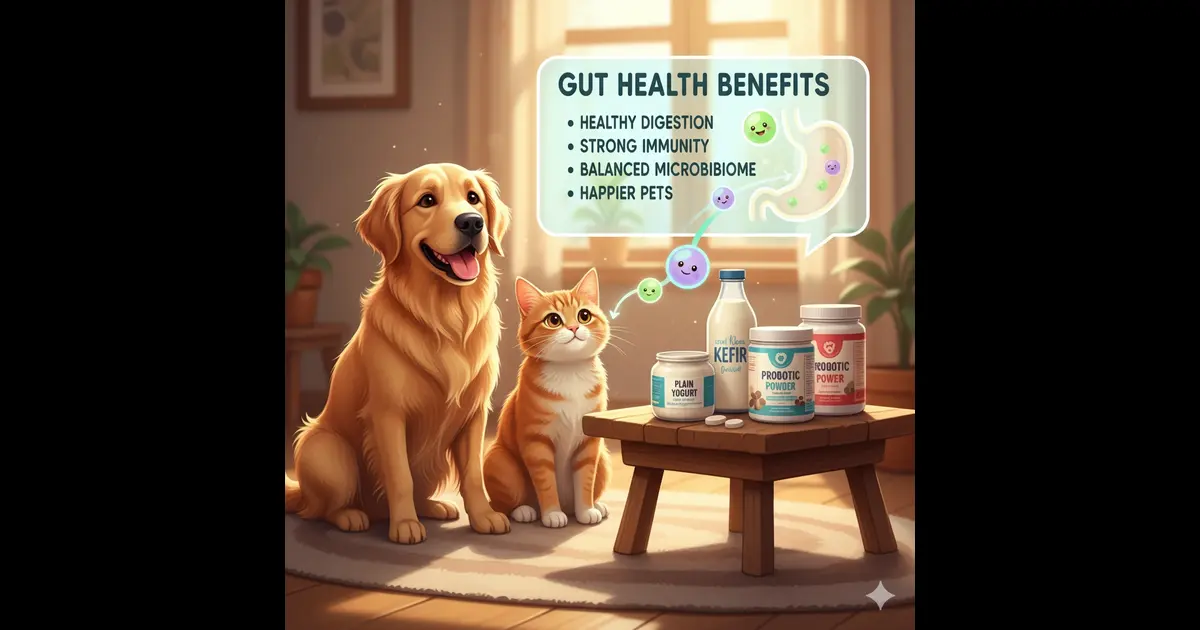Why Gut Health Matters for Pets
Gut health is quickly becoming a top priority for pet owners in 2025. Just like humans, pets rely on a balanced digestive system to absorb nutrients, maintain immunity, and support overall wellbeing. Probiotics, often called “good bacteria,” play a crucial role in maintaining this balance. They help regulate digestion, reduce inflammation, and even influence mood and energy levels. A healthy gut in dogs and cats is linked to better nutrient absorption, fewer gastrointestinal issues, and a stronger immune system. Understanding probiotics and their role in pet nutrition can empower pet owners to make informed dietary choices for their furry companions.
What Are Probiotics and How Do They Work?
Probiotics are live microorganisms, typically bacteria or yeast, that provide health benefits when consumed in adequate amounts. Common probiotic strains for pets include Lactobacillus, Bifidobacterium, Enterococcus, and Saccharomyces. These microbes colonize the intestines, where they help break down food, produce essential nutrients, and prevent harmful bacteria from taking over. By maintaining a healthy balance of gut flora, probiotics improve digestion, reduce bloating and gas, and support the immune system. In pets with sensitive stomachs or digestive disorders, probiotics can be especially beneficial in restoring normal gut function.
The Role of Probiotics in Digestive Health
Digestive issues are common in both dogs and cats, ranging from diarrhea and constipation to irritable bowel syndrome and food sensitivities. Probiotics work by promoting healthy intestinal microbiota, which is essential for smooth digestion. They enhance the breakdown of proteins, fats, and carbohydrates, ensuring that pets get the maximum nutritional benefit from their meals. Additionally, probiotics produce short-chain fatty acids that nourish the intestinal lining, reduce inflammation, and help prevent leaky gut syndrome. Pets fed probiotic-rich diets often experience fewer digestive disturbances and improved stool quality.
Supporting Immune Function with Probiotics
A large portion of the immune system resides in the gut, making gut health critical for overall immunity. Probiotics strengthen the intestinal barrier, preventing harmful pathogens from entering the bloodstream. They also modulate immune responses, reducing excessive inflammation while enhancing the body’s natural defense mechanisms. Pets with weak or compromised immune systems, including senior dogs and kittens, can benefit significantly from regular probiotic supplementation. By supporting immunity, probiotics help pets fight infections, heal faster from illness, and maintain overall vitality.
Mental Health and Probiotics: The Gut-Brain Connection
Recent research highlights the connection between gut health and mental wellbeing, commonly referred to as the gut-brain axis. Just as in humans, pets can experience mood and behavioral changes linked to digestive imbalances. Probiotics contribute to the production of neurotransmitters like serotonin, which influence mood and stress levels. Dogs and cats with gastrointestinal disturbances often show irritability or anxiety, and supplementing with probiotics may help improve behavior and emotional health. A well-balanced gut can lead to a calmer, happier, and more active pet.
Choosing the Right Probiotics for Your Pet
Not all probiotics are created equal, and different strains serve different purposes. When selecting a probiotic for your pet, look for species-specific formulas designed for dogs or cats. High-quality products should list the bacterial strains and the colony-forming units (CFUs), which indicate potency. Veterinarians often recommend probiotics tailored to your pet’s age, size, and health condition. Some probiotic supplements are available in powders, capsules, chews, or fortified pet foods, making it easy to incorporate them into daily meals. Consistency is key, as regular supplementation ensures a stable and thriving gut microbiome.
Probiotics in Commercial Pet Foods
Many premium pet foods now include probiotics to promote digestive health naturally. These foods often feature prebiotics, which act as food for probiotics, helping them thrive in the gut. Common prebiotic ingredients include chicory root, inulin, and beet pulp. Combining probiotics and prebiotics creates a synbiotic effect, enhancing the overall health benefits for pets. When choosing commercial foods, opt for brands that use live, active cultures and avoid overly processed formulas that may destroy beneficial bacteria.
Homemade and Natural Sources of Probiotics
In addition to commercial foods, pet owners can provide probiotics through natural sources. Yogurt and kefir are popular options for dogs, but it’s important to choose plain, unsweetened varieties free of xylitol, which is toxic to pets. Fermented vegetables and specially prepared probiotic treats are also beneficial for digestive health. Always introduce new foods gradually to avoid digestive upset and consult your veterinarian before adding human-grade foods to your pet’s diet. Homemade options can complement a balanced diet while supporting gut health naturally.
Signs Your Pet May Benefit from Probiotics
Pets with certain symptoms may benefit significantly from probiotic supplementation. Common signs of digestive imbalance include diarrhea, constipation, gas, bloating, and loose stools. Pets with frequent allergies, skin irritations, or low energy may also have underlying gut imbalances. Puppies and kittens transitioning from mother’s milk to solid food can particularly benefit from probiotics to establish healthy gut flora. Senior pets or those recovering from antibiotic treatments often need probiotics to restore a balanced intestinal microbiome and improve overall wellbeing.
The Role of Probiotics in Long-Term Health
Regular probiotic supplementation can have long-term benefits beyond digestion. Maintaining a healthy gut supports heart, liver, and kidney function, reduces chronic inflammation, and enhances nutrient absorption. Pets with strong gut health are more resilient against disease and recover faster from illness or surgery. Incorporating probiotics into daily nutrition is an investment in your pet’s longevity, supporting a healthier, happier, and more active life. Holistic pet wellness strategies now recognize gut health as a cornerstone of overall vitality.
Final Thoughts: Prioritizing Gut Health for Your Pet
Probiotics are a powerful tool in maintaining your pet’s digestive health, immune function, and overall wellness. Whether through high-quality supplements, probiotic-rich foods, or natural sources, these beneficial bacteria help pets thrive in every stage of life. As pet wellness trends in 2025 emphasize holistic nutrition and gut-focused care, understanding probiotics empowers owners to make informed choices. By supporting your pet’s gut microbiome, you are enhancing their energy, mood, skin and coat health, and longevity, ensuring that they live a vibrant and happy life by your side.



